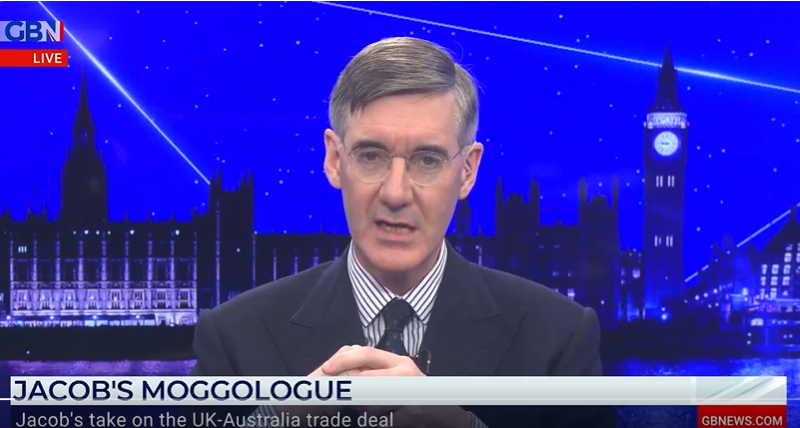The Tory MP revisited the popular referencing among Brexiteers of the repealing of the Corn Laws in the mid-nineteenth century.

The former Brexit opportunities minister made the comments on his GB News show as he bigged up the ‘first post-Brexit trade deal’ taking place with Australia and New Zealand. According to the outspoken host, the removal of trade tariffs between the respective countries will ‘make produce cheaper for British consumers.’ Rees-Mogg then went on to cite the mid-nineteenth century Corn Laws as supposed proof that the removal of tariffs will result in cheaper prices.
The Corn Laws were tariffs and other trade restrictions on imported food and grain. They ensured lucrative profits for landowners and led to free traders demanding their abolishment in order to protect the living standards of the poor, and, most urgently, alleviate the Irish famine. When the laws were finally repealed in 1846 they ushered a new era of free trade, and the cost of bread fell, boosting the spending power of the country.
The Corn Laws are often referenced by Brexit commentators like Jacob Rees-Mogg has some kind of evidence of the benefits of free trade.
Ironically, the Corn Laws split the Tory party in a similar way that Brexit has today. Additionally, critics of the Corn Laws’ model warn that a similar unilateral move in Britain would expose sectors like farming and automobile to potentially devastating competition.
Rees-Mogg’s comments this week that ‘like those anti-corn law campaigners, the British people should now have the right to do away with protectionism and have cheaper food from around the world,’ ignited plenty of reaction.
Pointing to comments the outspoken Brexiteer had previously made about Brexit import implications risking pushing the price of goods up, political commentator Marina Purkiss wrote:
“Allows… Being single allows one to date supermodels, aint gonna happen though is it. In fact, food prices are going to go up aren’t they? You even said so yourself….”
Femi alluded to the same point, sharing a clip of Rees-Mogg saying that Brexit will increase food prices by up to 71 percent in 2024.
Others questioned the trustworthiness of the Tory MP: “… I do know that bread and milk are more expensive. I also know you can’t trust JRM to tell the truth on anything,” someone posted, while others noted how not only has food become more expensive since we left the EU, but it is also lower in quality and is sometimes unavailable.
Rees-Mogg’s comments come as industry data shows that UK shop price inflation in May rose to its highest rate for at least 18 years. The cost of products increased at an annual rate of 9 percent in May, up from 8.8 percent in April, marking the fastest increase since British Retail Consortium records began in 2005.
Furthermore, research by the London School of Economics shows Brexit is responsible for a third of UK food price inflation. The economists say border costs have added £7 billion to grocery bills, undermining claims by the government – and ardent Brexiteers like Jacob Rees-Mogg – that the EU divorce has benefited Britain.
Gabrielle Pickard-Whitehead is a contributing editor to Left Foot Forward
Image credit: Twitter screen grab
Left Foot Forward doesn't have the backing of big business or billionaires. We rely on the kind and generous support of ordinary people like you.
You can support hard-hitting journalism that holds the right to account, provides a forum for debate among progressives, and covers the stories the rest of the media ignore. Donate today.



